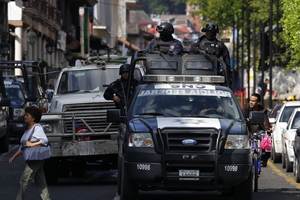Mexico’s National Human Rights Commission received more than 7,000 complaints for torture and other ill-treatment between 2010 and 2013 © Claudia Daut/Reuters
Judging by some international headlines, you might think that things are looking up for Mexico. Its President, Enrique Peña Nieto, has said he is on the road to transforming and modernizing the country.
A TIME magazine cover portrait of the President earlier this year was headlined ‘Saving Mexico’. The government has played an important role in promoting human rights dialogue with other nations, including championing the Arms Trade Treaty over the past two years. And an economist named Mexico as one of the growing markets to watch out for, including it in a select group of up and coming economies known as “MINT” (Mexico, Indonesia, Nigeria and Turkey).
All in all, Mexico has strong ambitions of playing a leading role within MINT and the G20.
But, as Amnesty International’s latest report finds, Mexico’s international plans are being undermined by its national policies and practices.
Human rights abuses are widespread and violence continue to plague the country.
Our report finds that complaints of torture and other ill-treatment in Mexico by police and the military have increased by a staggering sixfold over the last decade—and since the war on drugs—to 1,500 last year.
The torture includes electric shocks, rape and mock executions; making the report a painful read.
My own conversations with torture survivors in Mexico have moved me to believe that every public official in Mexico–from local police officer up to the President himself—should read every page.
As one torture survivor put it: “Torture is out of control in Mexico and it doesn’t only affect the person suffering it, it hurts society as a whole”.
When I met President Peña Nieto in Mexico City back in February, he told me he believes strongly in protecting and respecting human rights. Now is the time for him to demonstrate this commitment, waiting even one more day would be a wait too long.
Mexico has signed up to many international and regional treaties and protocols. But the President has not publicly acknowledged or begun to combat torture in his own country in earnest.
The official bodies tasked with recording and investigating the problem are woefully failing to do so. Complaints are frequently dismissed or downgraded by prosecutors and judges without reason.
Less than one per cent of victims of human rights violations, including those who have been tortured, have seen the National Human Rights Commission (CNDH) issue a public recommendation on their cases, and the overwhelming majority of complaints are under lock and key, unavailable for public scrutiny, even for the victims themselves.
This encourages a culture of impunity for perpetrators of torture, who rarely, if ever, face prosecution for their actions. There have been only seven recorded convictions of torture in the federal courts of Mexico, and the problem is even worse at state level.
Terrifyingly, only one in 20 of those who lodge complaints of torture and other ill-treatment with the CNDH are examined by forensic doctors as part of a criminal investigation by the federal public prosecutor.
Those investigations that do happen often fall short of international standards as set out in the ‘Istanbul Protocol’. Results are frequently declared negative without justification and these flawed conclusions often close the door on justice for victims.
Even for the small minority of victims who the CNDH does recognise, justice is unlikely.
One woman we spoke to, who had been raped by the military, was offered reparations which included therapy sessions by army psychologists on a military base. The gesture is appalling.
The role that the police and the military are playing in this is key. Torture has a central role in policing and public security operations. It is often used to obtain forced “confessions” or implicate others in serious crimes.
Safeguards against arbitrary detention and to ensure access to legal defence are routinely breached, with prosecutors and judges turning a blind eye. The result is unfair trails and unsafe convictions, while many of the real perpetrators of serious crimes never face justice.
In Mexico City, I also met with Claudia Medina, who was arbitrarily arrested, beaten, and electrocuted at a naval base in Veracruz. She was forced to sign a confession she had never read.
Subsequent medical reports confirmed her allegations of torture and Claudia continues courageously in her fight for justice. To date, however, nobody has been held to account and prosecutors continue to pursue the unfounded case against her, based on her arbitrary detention and evidence extracted under torture.
This cannot and should not be the Mexico that President Peña Nieto wants. No country can tolerate violations on this scale.
When I met with the President earlier this year, I emphasised the importance of confronting the climate of impunity. He declared himself receptive to the messages from Amnesty International. In substance, however, nothing has changed.
The President must now act quickly and decisively to enact the recommendations Amnesty International and others, including local civil society, has given.
He must start with a public commitment to tackle the issue of torture which is truly out of control in Mexico.
The country needs an overhaul of its system for recording and investigating claims of torture and other ill-treatment and there must be an end to the use of arbitrary detentions.
This is a clearly achievable objective, if the President is prepared to make it a political priority.
It is not too late for him to deliver justice to Claudia, and thousands of others like her. It is essential for Mexico’s future.


